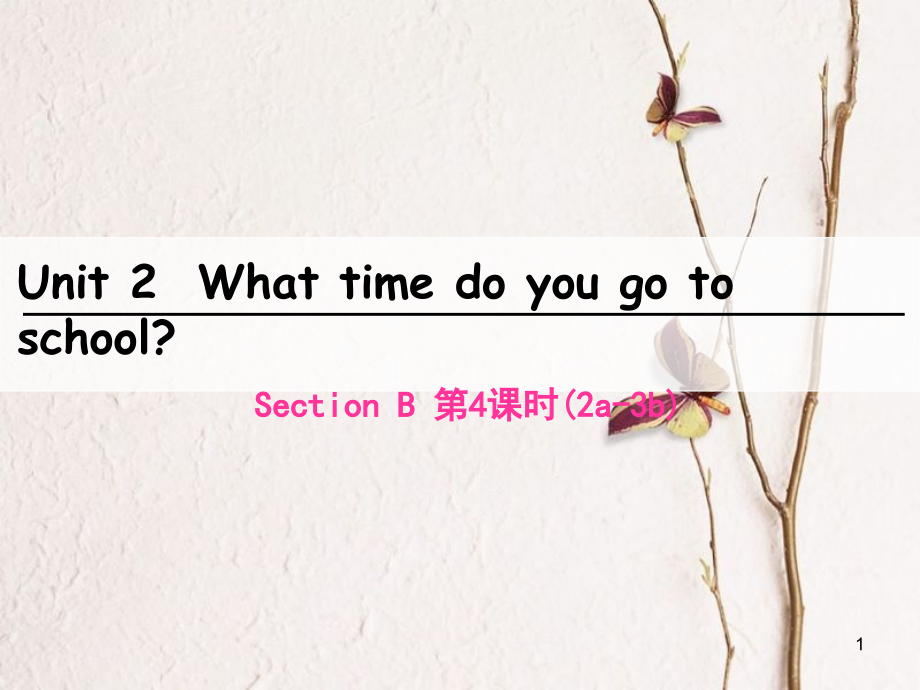《七年級英語下冊 Unit 2 What time do you go to school(第4課時)Section B(2a-3b)課件 (新版)人教新目標版》由會員分享���,可在線閱讀��,更多相關(guān)《七年級英語下冊 Unit 2 What time do you go to school(第4課時)Section B(2a-3b)課件 (新版)人教新目標版(20頁珍藏版)》請在裝配圖網(wǎng)上搜索����。
1�、Unit 2 What time do you go to school?Section B Section B 第第4 4課時課時(2a-3b)(2a-3b)1Revision用用when/what time 和你的同學(xué)編和你的同學(xué)編一段對話���。一段對話。When do you usually get up?I usually get up at seven oclock.What time do you usually go to school?I usually go to school at seven oclock.2用英語說出下列時間�����。用英語說出下列時間�。seven to twelv
2����、enine to oneten past elven3Check()the activities youthink are healthy.go to bed early_ eat ice-cream_ eat quickly _ eat vegetables_ play sports_ take a walk_2a4 Read the passage,and answer the questions.1.Who is healthier,Tony or Mary?2.When does Tony go to bed?Mary.At ten thirty.2b53.When does Mary
3、 go to bed?4.Whats the relationship between Mary and Tony?At nine thirty.Mary is Tonys sister.6 Write down the unhealthy habits of each person.Then think of healthy activities for them.2c7 Unhealthy habitsTony Mary gets up lateeats breakfast quicklyeat ice-cream after dinnerbrush teeth raraly in the
4����、 evening8 Healthy activitiesTony:Mary:gets up earlygoes to bed earlydoes sportsgoes to bed early9 Number these sentences in order to make a story about a daily routine.3a10_ I usually exercise from six to seven._ I always get up at six._ After that,I always brush my teeth and go to school at eight._
5、 Then I quickly have a shower and eat breakfast._ I have lunch at a quarter to twelve._ I get home from school at half past four and do my homework._ I have a very healthy life._ I have dinner at seven thirty._ I go to bed at ten.325 46718911Talk about your daily routine.I usually get up at seven oc
6���、lock.I exercise3b121.either的用法的用法作作副詞副詞時�,意為時��,意為“也也”(用于否定句或否定(用于否定句或否定詞組后)�。詞組后)。如如:I dont like hamburgers,either.常構(gòu)成常構(gòu)成“eitheror”結(jié)構(gòu)�����,意為結(jié)構(gòu),意為“要么要么.要么要么.����;或者;或者.或者或者.”�,它連接兩個并列主語時,謂語動����,它連接兩個并列主語時,謂語動詞要與其鄰近的主語在人稱和數(shù)上保持一致�����,詞要與其鄰近的主語在人稱和數(shù)上保持一致��,即謂語動詞要與即謂語動詞要與or之后的主語在之后的主語在人稱人稱和和數(shù)數(shù)上上保持一致保持一致�。如:如:Either you and I
7、are good students.你和我都是好學(xué)生����。你和我都是好學(xué)生。Language points132.At twelve,she eats lots of fruit and vegetables for lunch.lots of意為意為“很多,許多���,大量很多����,許多���,大量”�����,既可以,既可以修飾修飾可數(shù)名詞可數(shù)名詞也可以修飾也可以修飾不可數(shù)名詞不可數(shù)名詞��。如:如:I have lots of potatoes in my house.我房子里有許多土豆我房子里有許多土豆 14lots of相當于相當于a lot of�,意為,意為“許多����,很多,許多�����,很多,大量大量”�����,后面接可數(shù)名詞和不可
8�、數(shù)名詞均后面接可數(shù)名詞和不可數(shù)名詞均可可,接可數(shù)名詞時謂語用復(fù)數(shù)�����,接不可數(shù)���,接可數(shù)名詞時謂語用復(fù)數(shù)����,接不可數(shù)名詞時��,謂語用單數(shù)名詞時��,謂語用單數(shù)���。如:如:She has a lot of ice-cream.她有許多冰淇淋�����。她有許多冰淇淋����。There are a lot of books to be washed.有好多衣服要洗。有好多衣服要洗�。153.She knows its not good for her,but it tastes good!its not good for her“對她(某方面)不對她(某方面)不好好”,常用句型:�����,常用句型:its not good for.對對什
9��、么不好什么不好/對什么不利對什么不利�����。如:如:Junk food is not good for our health.垃圾食品對我們的身體不好�。垃圾食品對我們的身體不好��。16小結(jié)訓(xùn)練小結(jié)訓(xùn)練一����、單項選擇。一��、單項選擇。1.Tony doesnt have healthy lifestyle,his brother doesnt have a healthy lifestyle,_.A.too B.also C.either D.or2.Doing exercise every day is good _ your health.A.for B.at C.with D.inCA17二�、根據(jù)提示完成句子。二����、根據(jù)提示完成句子。1.I do _ _(許多許多)homework every day.2.The food _(嘗起來嘗起來)delicious.3.He doesnt like getting up early,_(也也).4.Either you or he _(be)wrong.5.Healthy food is _ _(對對.有好處有好處)us.lots oftasteseitherisgood for18完成當堂測評作業(yè)完成當堂測評作業(yè)19天才就是無止境刻苦勤奮的能力����。天才就是無止境刻苦勤奮的能力??ㄈR爾卡萊爾20
 七年級英語下冊 Unit 2 What time do you go to school(第4課時)Section B(2a-3b)課件 (新版)人教新目標版
七年級英語下冊 Unit 2 What time do you go to school(第4課時)Section B(2a-3b)課件 (新版)人教新目標版

